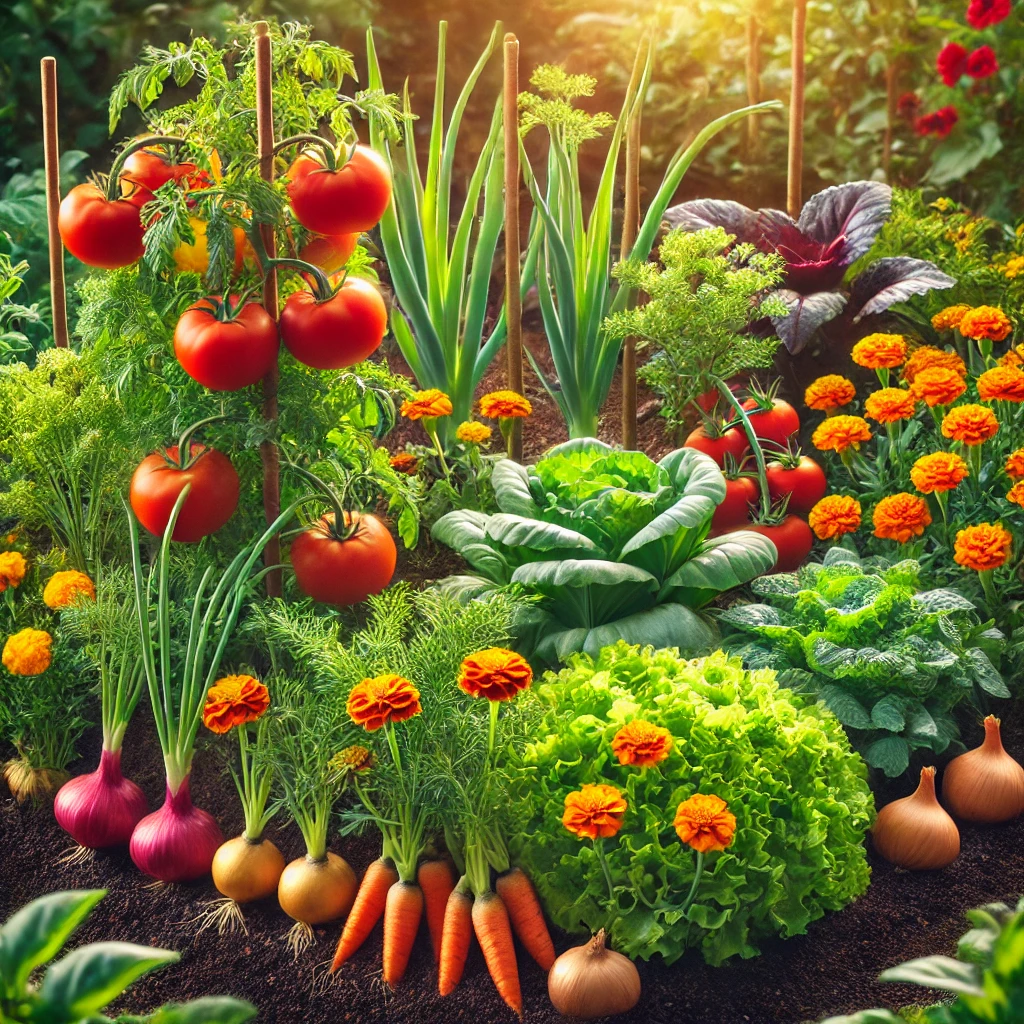These plant pairs work well together, promoting healthy growth and improving yields.
Vegetables & Their Best Companions

- Tomatoes – Basil, carrots, onions, marigolds, nasturtiums, lettuce, garlic
- Carrots – Onions, leeks, radishes, lettuce, rosemary, sage, chives
- Peppers – Basil, carrots, onions, spinach, marjoram, tomatoes
- Cucumbers – Corn, beans, peas, radishes, marigolds, dill
- Lettuce – Carrots, radishes, strawberries, onions, cucumbers
- Beans – Corn, squash, carrots, marigolds, rosemary
- Corn – Beans, squash, peas, sunflowers, cucumbers
- Squash/Zucchini – Corn, beans, radishes, marigolds
- Potatoes – Beans, cabbage, corn, marigolds
- Broccoli & Cabbage Family (Brassicas) – Celery, onions, dill, rosemary, nasturtiums
- Onions – Carrots, lettuce, strawberries, beets, chamomile
Herbs That Support Growth
- Basil – Tomatoes, peppers, oregano
- Dill – Cucumbers, lettuce, cabbage
- Rosemary – Beans, cabbage, carrots
- Marjoram – Almost all vegetables
- Chamomile – Onions, cabbage, cucumbers
Flowers for Pest Control & Pollination
- Marigolds – Repel aphids, nematodes, and whiteflies; great with tomatoes, beans, squash
- Nasturtiums – Attract pests away from tomatoes, cucumbers, and beans
- Sunflowers – Help corn, beans, and cucumbers by attracting pollinators
Plants That Should Never Be Planted Together
These plants compete for nutrients, attract common pests, or release chemicals that inhibit each other’s growth.
- Tomatoes & Potatoes – Both are prone to blight and should be kept apart.
- Carrots & Dill – Dill can stunt carrot growth if planted too close.
- Peppers & Beans – Beans can reduce pepper yields.
- Cucumbers & Potatoes – Both compete for nutrients and attract similar pests.
- Onions & Beans – Onions inhibit bean growth.
- Corn & Tomatoes – Corn attracts corn earworms, which also attack tomatoes.
- Brassicas (Cabbage, Broccoli) & Strawberries – Brassicas inhibit strawberry growth.
- Lettuce & Parsley – Parsley can overpower lettuce.
- Sunflowers & Potatoes – Sunflowers excrete chemicals that inhibit potato growth.
Final Tips for Successful Companion Planting
- Rotate Crops: Avoid planting the same family of plants in the same spot year after year to prevent nutrient depletion and disease buildup.
- Use Trap Crops: Plant pest-attracting plants like nasturtiums to keep pests away from main crops.
- Consider Vertical Growth: Vining plants like beans and cucumbers can maximize garden space when grown with supportive plants like corn.
- Encourage Pollinators: Grow flowers like marigolds, sunflowers, and lavender to attract beneficial insects.
By strategically pairing plants, you can create a thriving, productive, and naturally pest-resistant garden. Happy planting!
